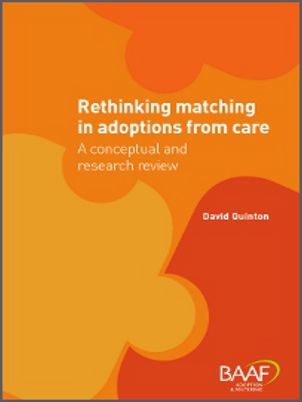
Rethinking matching in adoptions from care
£14.95
Current policy and practice agree that linking children’s needs and adoptive parents' capacities to meet them is the best way to ensure stability of placements. But how much do we really know about how to go about matching and the likely outcomes? Is there any evidence of what works and what doesn’t?
This groundbreaking conceptual and research review summarises the beliefs and principles on which matching is currently based, the evidence of its effectiveness, and the research that can guide the development of the matching process. It provides essential and thought-provoking reading for practitioners which will spark a rethinking of matching practice.
This is essential and thought-provoking reading for practitioners, managers and policy makers involved in the matching process.
AVAILABLE IN EBOOK AND HARD COPY
Questions about eBooks? Check out our FAQs
HARD COPY
Reviews
These interesting and important books question two widely held beliefs about adoption. These books, perhaps, are part of a slowly changing outlook in UK adoption, as the view takes hold that transracial adoption is not so bad after all and that professionals might give some autonomy back to adoptive parents and children in matching…Rethinking Matching makes a very helpful contribution toward considering how adoption policy in the UK and elsewhere can be rationally reformed on the basis of a clear understanding of key concepts and on evidence.
Peter Hayes Ph.D., Senior Lecturer in Politics, University of Sunderland, Adoption Quarterly
David Quinton’s book is very welcome. It is excellent. He provides description of research findings and practice guidance as well as detailed analysis, and he raises important issues. This book should, in my view, be read by all practitioners in social services, health and education who are involved in adoption, as well as by managers and those who allocate resources. It provides very helpful information but it should also provoke much thought about what is currently being done and why.
Margaret Adcock, independent social work and child care consultant, Adoption & Fostering
